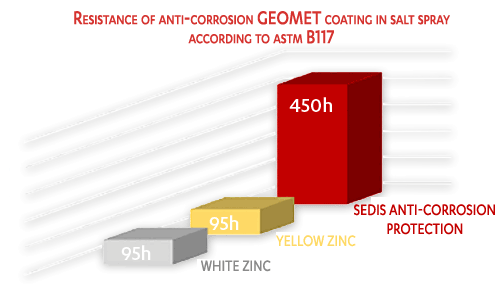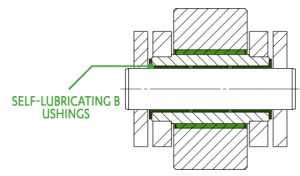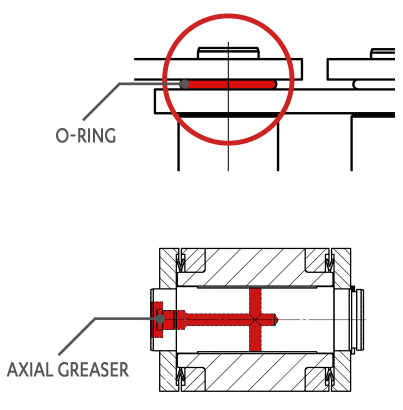► Case hardening:
Carburization is a thermochemical treatment that enriches the carbon on the surface. This carburization is followed by quenching to obtain surface hardening of the carburized layer and help improve wear resistance.
All our standard chains have case hardened pins and bushes, plates made of weldable carbon steel and hardened rollers that can be case hardened on request for greater wear resistance.
Chain technique – Conveyor chain
SEDIS technical solutions for conveyor chains
solutions against wear
standard working conditions
difficult conditions (friction and seizing problems)
► Mos2 :
The pins are treated with Mos2 to facilitate running-in and reduce wear. This treatment limits the friction in the articulations and reduces seizing. Consult us.
severe applications (abrasion, waste, etc.)
► DELTA® PINS: When a greater resistance to hinge wear and abrasion is required, for a longer chain service life.
DELTA® pins are thermochemically treated to achieve surface hardness two or three times greater than that obtained by case hardening, for unrivalled abrasion and wear resistance (1800 Vickers compared with 700 Vickers for conventional carburization).

• Significantly reduced friction in the links to push seizing back to the limit.
• Increased protection of the pins against corrosion thanks to its chemical inertness, thus guaranteeing better wear resistance over time.
In addition to the pins, it is possible to treat the bushes to provide the chain with even greater resistance to wear: consult us.
The SEDIS technical departments can recommend
the chain and treatments best suited
to your application.
Do not hesitate to consult us and send us your technical requirements!
anti-corrosion solutions
applications requiring an anti-corrosion protection
► Galvanization:
Electrolytic treatment that improves corrosion resistance thanks to the depositing of a layer of zinc on the surface: for applications requiring a minimal degree of anti-corrosion protection.
Other types of zinc plating are possible on request (hot galvanizing, etc.). Consult us.
CAUTION: Do not use stainless steel wheels with galvanized chains, to avoid any galvanic (dissimilar metal) corrosion.
severe applications requiring reinforced anti-corrosion protection
► SEDIS ANTI-CORROSION PROTECTION: for any severe application where greater corrosion resistance is required, and where a standard or galvanized chain cannot be used.
The chain’s metallic parts (excluding the pins) are protected against corrosion by a mineral coating based on zinc and lamellar aluminum. It is the zinc that oxidizes in preference to the steel:

The corrosion resistance provided by this SEDIS treatment is significantly better than that offered by other conventional treatments such as galvanization. We owe its higher performance to its cathodic protection characteristics.

CAUTION:
Do not use stainless steel wheels with anti-corrosion treated chains, to avoid any galvanic (dissimilar metal) corrosion.
This anti-corrosion treatment of the parts can be associated with Delta® pins to combine anti-corrosion protection and resistance to wear for a longer service life.
► Stainless steel :
It is the presence of chrome in the steel that gives it increased corrosion resistance.
We can propose every type of stainless steel according to your application’s specific problems (corrosion, wear, etc.). Consult us.
The SEDIS technical departments can recommend
the chain and treatments best suited
to your application.
Do not hesitate to consult us and send us your technical requirements!
maintenance-free solutions
In many applications it is difficult or even impossible to lubricate the chain. For example:
• Risk of oil splashing, damaging the products being transported,
• Risk of fire if the lubrication oil can come into contact with a flame or products at a high temperature,
• Operation in a fluid environment (water in particular),
• Risk of pollution by the lubrication oil.
applications where lubrication is difficult or impossible
► VERTE® self-lubricating chain
A standard chain will have a limited service life if it is not correctly lubricated.
The solution is therefore the VERTE® chain which does not require lubrication, thanks to its self-lubricating composite bushings placed between the pins and bushes and/or between the bushes and rollers.

The selection of VERTE® chains suited to their utilization will be made by the SEDIS technical department in compliance with the application’s technical requirements, in line with the operating characteristics and the needs to be met.
The VERTE chain composite bushes can be associated with Delta® pins and the SEDIS anti-corrosion treatment for a higher performance and resistance.
In this case, the wheels designed for these chains are made of galvanized steel, or of chromate-passivated galvanized steel with light lubrication of the teeth to avoid premature wear. Wheels with inserted plastic teeth can also be used if no lubrication of the gears is permitted.
CAUTION: Do not use stainless steel wheels with VERTE® chains that have received an anti-corrosion treatment.
► For applications that are even more severe in chemical terms (dairies, nuclear, etc.) it is possible to make VERTE® chains with stainless steel (austenitic, martensitic, ferritic). In this case the wheels are either made of stainless steel of the same type or of plastic. Consult us.
maintenance-free applications for which VERTE® chains cannot be used
► Sealing ring chains: when the application does not permit the use of a VERTE® chain (because of the pressure or speed for example), sealing rings can be used (V-ring, O-ring, etc.) between the inner and outer plates to seal the articulation off from the external environment and confine the lubricant. Maintenance is therefore not required.
► Axial greasing: greasers can be integrated in the chain’s pins in order to distribute the lubricant in the articulations.
This process makes it possible to lubricate the chain from the inside outwards.
This solution can be associated with rings for even better sealing with respect to the surroundings.

